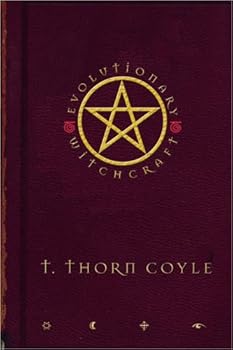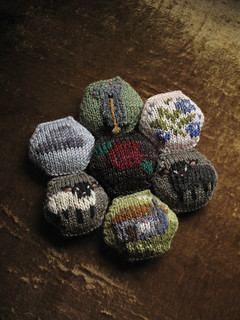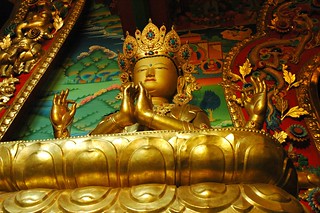From the perspective of the faith I’ve been building I haven’t actually given this part a lot of thought — I think I’ve just sort of grafted my personal ideas onto it.
Which makes sense, as the faith I’m building is being built out of my nebulous thoughts and ideas about the world and the gods and my role in all of this.
So. Uh.
I give the idea of birth — of the universe, of our souls, of Being — some thought in The Story of the Smith. I also touch on death and rebirth.
My beliefs are influenced by science, Reclaiming, and Buddhism. I’ve always believed in reincarnation; it just made the most sense. The universe’s way of recycling. Later, I learn that matter cannot be destroyed or created, merely changed. This supports my belief in reincarnation. When I read about Reclaiming, and the cycle of birth/growth/death/decay/regeneration, it adds to what I’ve always known, further clarifying it in how it relates to the world around me.
I don’t give much thought to the afterlife. If anything, I think we’re given a brief time of rest between death and rebirth, in a neutral between-life place, where we can choose to learn or relax or whatever. But beyond that, it doesn’t matter. We’re born, we live, we die, we’re born again. Birth, growth, death, decay, regeneration.
I see people make the argument that because of reincarnation, whatever we do in this life doesn’t matter — we’ll reroll in a little while.
It’s not like creating alts in World of Warcraft. You don’t just get to reroll as a pally because your rogue keeps getting ganked and start with a fresh slate. (I sucked at playing rogues. Stealth is…not my strong suit.)
All the myriad factors that went into creating you, with your personality, quirks, hopes, dreams, ambitions, ways of seeing the world — they’re unique. They’re not going to create you, as you are in this life, again. When you die, I may believe that some part of your essence goes on to live again, but it’s like taking a glass of water, dumping it into the ocean, and then scooping out another glass of water from that same spot in the sea. There may be some molecules of water from the original glass in the next one, but it’s not the same glass of water.
This is why every life is precious, and this is why what we do in this life matters so much.
This is also why I see attaining enlightenment as unimportant. I am not concerned with levelling until I reach level cap. (Yes, continuing with the WoW metaphor, because it’s working for me.) I am concerned with clearing out all the Murlocs from Eversong Woods before I move on to the Ghostlands.
I am concerned with doing good work while I am here to do it. If, eventually, I do reach enlightenment, I will honestly probably come back so I can continue to do good work. (I don’t think I’ll ever reach it, though, so it’s a moot point. I reaaaally don’t have what it takes to be a Bodhisattva.)
If, indeed, enlightenment is even something that can be classified/attained linearly. If, indeed, enlightenment is a state reached and not actions taken.
In The Story of the Smith, souls are created when sparks fly off the striking of the Smith’s hammer to anvil. They cannot really be created, however; they were always there, when the Smith’s house is tiny and cramped in the still-dark, and they are there when the house has expanded to create the large universe. At the end of the Smith’s day, the universe contracts again until it is very small, and things grow cold while the Smith and the Others sleep before the next day.
And within that huge cycle of the universe’s birth, growth, death, decay, and regeneration, within that huge cycle that mirrors the seasons of our year, we play out the same cycles in miniature, as does all the life contained in the universe.
In my myth, the Smith is birth. The Phantom is life — the spirit that gives life breath. And the Deep One is death.
When I wrote it, I thought of Brighid as the Smith, the Morrigan as the Phantom, and Manannan as the Deep One — but the primordial creator beings could be represented by any three deities you choose, or one deity, or no deity — they could remain abstract. There’s lots of room for interpretation.
So. In this nameless religion I am building from the ground up, how do birth, death, and rebirth fit?
Brighid is birth. She is the divine midwife; She is the sun that coaxes plants to bloom. She is a mother — to Her child, to Her Work. She creates on all levels, down to the very universe itself, which is Her house. Being made of star stuff, we are made of Brighid-stuff.
When we give thanks for being born, we give thanks to Brighid. When we need help birthing something or someone new into the world, we ask Brighid for help.
The Morrigan is life. She is the blood flowing through our veins; Ze is the loamy earth upon which we make love. All the hot passions of living are Hers; all the agony of fighting constantly belongs to Zir. She is the earth’s heartbeat — from when it starts to when it ends. Because Ze is life, She is also when life needs to be pruned — Ze is the power of the knife.
When we feel our hearts beating so fast we think we might die and we know we’re truly alive, we’re in Her space. When we need the strength to fight, to keep life livable for ourselves and others, Ze will help us. When we need to cut away the dead branches that do not belong, it is Her power that lends us the blade.
Manannan is death. If the Morrigan is the one who cuts off the dead branches, He is the one who gathers them up and takes them to their resting place. He is the Welcomer; He is the Gatekeeper. He is the shepherd of bodiless souls. His realm, the ocean, is not a place humans can walk freely — it is still mysterious and dangerous to us. It is the underworld.
When we die, it is Manannan who greets us on the other side, who takes us to where we need to be. When we need comfort, it is Manannan we can call on — because He knows the pain we go through, and He can give us guidance and love as we navigate those rocky waters ourselves. When we need help dealing with the death of someone in our lives, we can call upon Manannan for entrance into those mysteries; we can ask Him to lend us a lamp so we may find our way.
You can see there is overlap here — Manannan is the ocean and Brighid is the sun, but Manannan is also the rain — water that goes up into the atmosphere, near the sun, and then rains down onto the land — the Morrigan’s realm. The sun helps the land and the upper reaches of the ocean thrive, and the land and the ocean work together to make life continue.
None of these realms are separate from each other, and neither are the gods I see as ruling these areas. They work together as integral parts of a whole.
Just like birth, death, and rebirth.



















